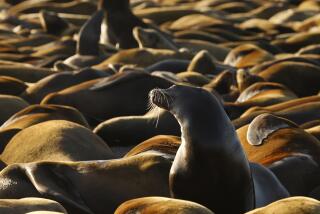Team Can’t Link Porpoise Deaths, Sonar
- Share via
SEATTLE — Experts who examined 11 harbor porpoises that died last spring -- about the time a Navy ship conducted sonar tests in the area -- found no evidence that the sound waves were a factor.
But so-called acoustic trauma cannot be ruled out, since porpoise remains examined by experts were decomposed, the experts wrote in a report for the National Marine Fisheries Service, a monitoring agency.
“No matter which side you’re on, you can interpret the report as supporting your claims,” said Brian Gorman, Fisheries Service spokesman.
Decomposition of the remains made it “very difficult if not impossible ... to determine a cause of death linked to soft tissue,” such as the animal’s hearing organs, he said.
The experts found that two of the porpoises died of blunt-force trauma, possibly caused by hitting ships or colliding with other animals.
Illness -- such as pneumonia and peritonitis -- was implicated in the deaths of three porpoises.
No cause of death could be determined for the six other animals.
The investigation followed reports on May 5 of killer whales, porpoises and minke whales suddenly trying to flee waters around Haro Strait, north of Puget Sound between San Juan and Vancouver islands.
The Navy later confirmed that the guided-missile destroyer Shoup had been training with midrange sonar in the area briefly that day.
“We believe this report proves ... what we’ve said from the beginning,” said Rear Adm. Len Hering, commander of the Navy’s Northwest operations. “The Shoup did not kill or cause the deaths of those animals.”
He said the findings were consistent with the Navy’s own report, also released Monday.
More to Read
Sign up for Essential California
The most important California stories and recommendations in your inbox every morning.
You may occasionally receive promotional content from the Los Angeles Times.













